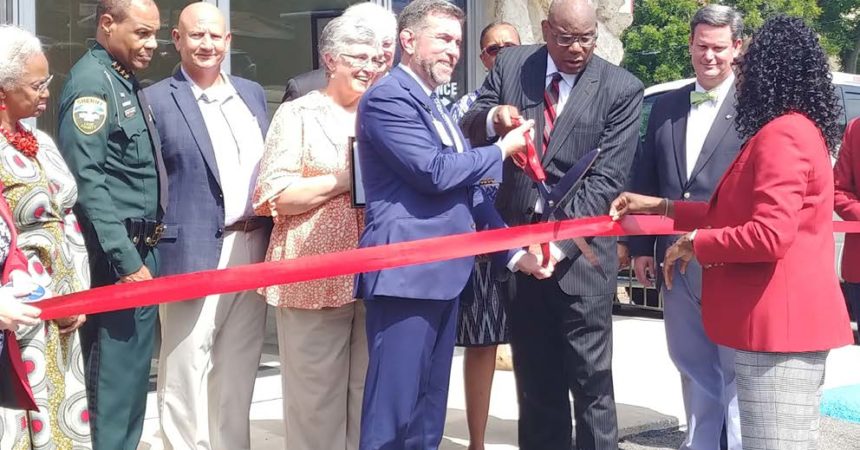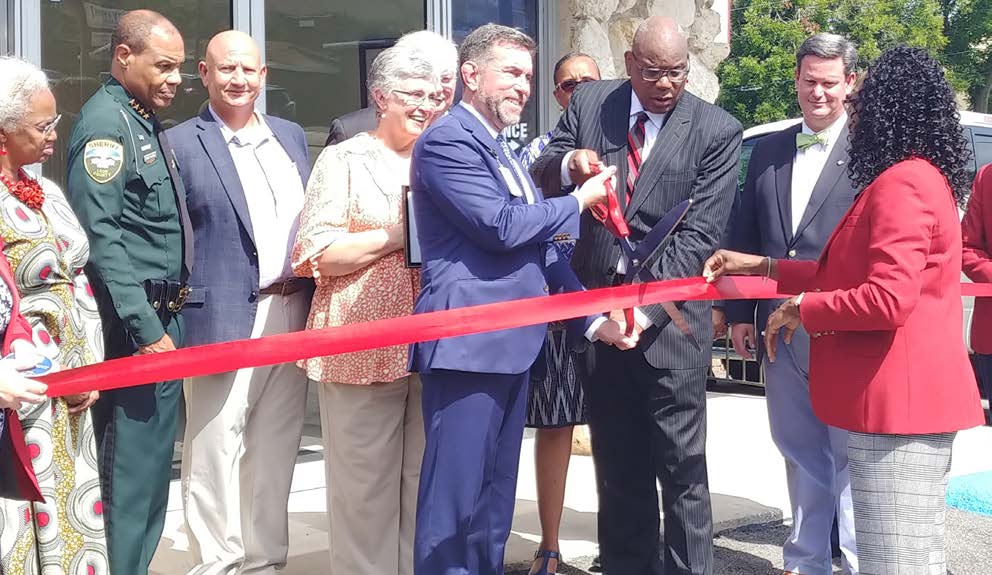
Apalachee, Bethel partner to open mental health center

Jay Reeves, CEO at Apalachee Center joined Rev. R. B. Holmes in a ribbon cutting at the announcement of their merger.
Photo by St. Clair Murraine
By St. Clair Murraine
Outlook staff writer
With a sense of relief on his face, Leon County Sheriff Walt McNeil was ecstatic outside of the building that houses Apalachee Center at Bethel.
It was McNeil’s turn to speak during ceremonies last Thursday that marked the launching of a partnership between Bethel Missionary Baptist Church and Apalachee Center to open a mental health center.
“I’m perhaps the happiest person here this morning,” McNeal said to his audience under a huge white tent. “I hope that this now means that Leon County Detention Center is no longer the primary treatment facility for persons suffering from mental health problems in our community.”
Between 30 and 40 percent of inmates at the Leon County Detention Center has some form of mental illness, McNeil said.
The Apalachee Center at Bethel is located between Martin Luther King Blvd. and McComb Street near Frenchtown. A survey done by the Mental Health Council of the Big Bend has found that Frenchtown residents have the highest level of mental illness in comparison to other Tallahassee neighborhoods.
Bethel and Apalachee started talks about the merger nine months ago, said Jay Reeves, CEO of the Apalachee. He added that when R.B. Holmes, pastor at Bethel and publisher of the Capital Outlook, brought the idea to him, it was a no-brainer.
This is “a major moment,” Holmes said just before the ribbon cutting. Having a place near Frenchtown to treat mental illness “will help removing the stigma to know if you’re suffering from depression and mental distresses this community is here to help.”
The Bethel Family Counseling Center previously operated from the building for 15 years. The center will open daily from 9 a.m. to 5 p.m.
The Center becomes Apalachee’s ninth annex in the Big Bend, Reeves said. It also the third initiative recently launched by Apalachee, which was approved as an alternate court site in Leon County where a judge could hear cases involving to mental health issues. It also has formed Tallahassee’s first Mobile Response Team, which will be among first responders to calls involving someone with a mental health crisis.
The new location will become Florida Assertive Community Treatment Team’s headquarters. It also will provide services that include tele-phychology, which allows a treatment professional and a client to interact remotely.
The community needs all that the Center provides, said Mayor John Dailey, who is a member of Apalachee’s board of directors.
“Mental health is one of those issues that we all are dealing with personally; we are related to someone who is dealing with it or we know someone who is dealing with mental health issues,” Dailey said. “But we are still uncomfortable to talk about it as a community and society.”
Incarcerated clients will also have access to the center, Reeves said. He added that servicing inmates is part of an on-going agreement with Apalachee and the Sheriff. Apalachee also has a team that goes to the detention center to identify and register inmate with mental illness.
“This is the important thing we can do in the community to try to treat those persons to try to keep them from going deeper in the criminal justice system,” McNeil said. “Often times, people who find themselves suffering from mental health depression and other things find themselves on the other side of the law. They find themselves committing crimes or being a victim of crime.”
Some of the recent crimes involving guns that the city has been experiencing are committed by people with mental health issues, McNeil said. Holmes pointed to that as a reason for the Center.
“Any time you kill a person over 50 cents, there is a mental disconnect,” Holmes said, referring to a shooting involving teenagers. “Anytime you kill a person at a barber shop and hold a baby hostage it’s a mental health issue.
“We’ve got to try to catch it on the front end and not on the latter end.”
Retired school teacher and Sen. Bill Montford said he’s seen mental illness in the classroom. He praised the merger for the resource it will provide.
“We as human being have a moral obligation to do what we are doing here today,” Montford said. “That is to combine forces to address these issues and make life better.”







